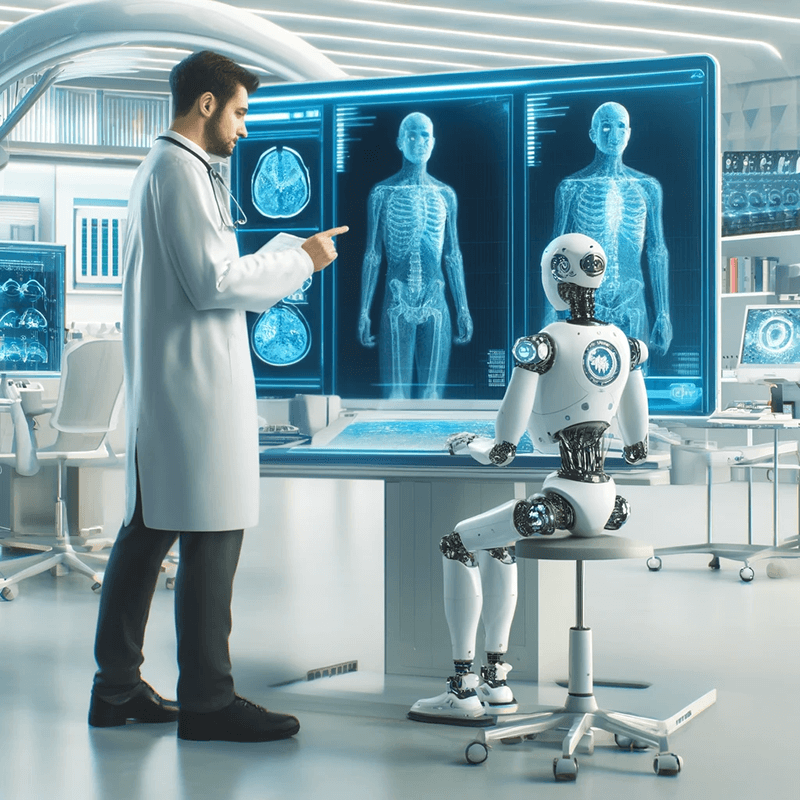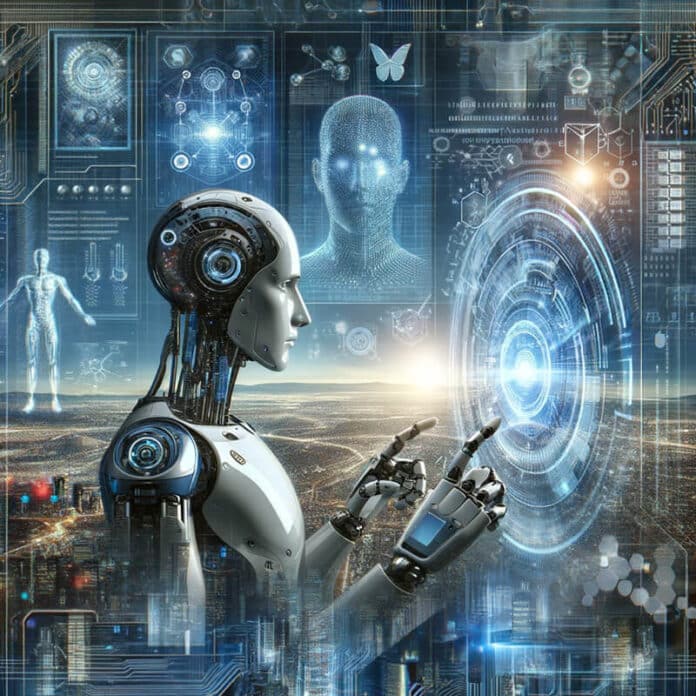Table of Contents
Artificial Intelligence (AI) is not just a futuristic concept but a powerful force already reshaping our world. As technology advances, the future of artificial intelligence promises even more profound transformations across various sectors. This article delves into the potential developments in AI, its impact on different industries, and the ethical considerations that will shape its trajectory.
Future of Artificial Intelligence
The evolution of AI technology is marked by significant advancements in machine learning, neural networks, and natural language processing (NLP). These improvements are paving the way for Artificial General Intelligence (AGI), where machines can perform any intellectual task that a human can do. Although AGI remains a distant goal, progress in AI’s cognitive abilities suggests that we are steadily moving towards more sophisticated and capable systems.
Another exciting frontier is quantum computing. Quantum computers, with their ability to process vast amounts of data at unprecedented speeds, could revolutionize AI. This combination can lead to cryptography, material science, and drug discovery breakthroughs, pushing the boundaries of what AI can achieve.
| AI Technology | Current State | Future Potential |
|---|---|---|
| Machine Learning | Advanced algorithms | Enhanced predictive capabilities |
| Neural Networks | Deep learning models | More complex and accurate models |
| Natural Language Processing | Effective communication tools | Near-human level understanding and response |
| Quantum Computing | Early stages of development | Solving complex problems beyond classical computing |
AI in Healthcare

The healthcare sector stands to benefit immensely from AI advancements. AI-powered diagnostic tools, such as imaging systems, can accurately analyze medical scans, identifying conditions like tumors and fractures faster than human radiologists. Predictive analytics can forecast disease outbreaks and patient outcomes, enabling proactive interventions and personalized treatment plans.
AI’s role in drug discovery is a game-changer, particularly in terms of cost. Traditional drug development is a time-consuming and costly process. However, AI can expedite this by analyzing vast datasets to identify potential drug candidates and predict their effectiveness. This not only accelerates the development timeline but also significantly reduces costs, making treatments more accessible and affordable for all.
| Healthcare Application | Current AI Role | Future Impact |
|---|---|---|
| Diagnostic Imaging | Accurate and rapid analysis of scans | Increased accuracy and speed in diagnosing diseases |
| Predictive Analytics | Forecasting outbreaks and patient outcomes | Enhanced preventive care and personalized treatments |
| Drug Discovery | Identifying potential drug candidates | Faster, cost-effective drug development |
Future of Artificial Intelligence in Business and Industry
Businesses across industries are discovering the power of AI to gain a competitive edge. In manufacturing, AI-driven automation is a trend and a necessity for survival. It optimizes production lines, improves quality control, and reduces operational costs. Predictive maintenance systems, powered by AI, are revolutionizing maintenance strategies, minimizing downtime and maximizing productivity. The potential of AI in business is limitless, and it’s time for all industries to embrace this technology.
AI algorithms enhance fraud detection, risk assessment, and customer service in the financial sector. Automated trading systems analyze market trends and execute trades at lightning speed, capitalizing on opportunities that human traders might miss. AI-powered chatbots and virtual assistants provide 24/7 customer support, improving user experience and satisfaction.
| Industry | Current AI Use | Future Potential |
|---|---|---|
| Manufacturing | Production optimization and quality control | Fully automated production lines and predictive maintenance |
| Finance | Fraud detection and automated trading | Enhanced risk management and customer service |
| Customer Service | Chatbots and virtual assistants | More sophisticated and human-like interactions |
Future of Artificial Intelligence in Business and Industry in Transportation
The transportation industry is undergoing a significant shift with autonomous vehicles. Self-driving cars, powered by advanced AI systems, have the potential to reduce accidents, lower traffic congestion, and improve fuel efficiency. Companies like Tesla, Waymo, and Uber are at the forefront, conducting extensive testing to ensure safety and reliability.
Beyond personal transportation, AI is revolutionizing logistics and supply chain management. AI-powered optimization algorithms streamline route planning, inventory management, and demand forecasting, ensuring timely deliveries and reducing costs.
| Transportation Sector | Current AI Innovations | Future Impact |
|---|---|---|
| Autonomous Vehicles | Self-driving cars in testing phases | Safer, more efficient transportation systems |
| Logistics and Supply Chain | Route planning and inventory management | Streamlined operations and reduced operational costs |
Ethical and Societal Implications
As AI continues to advance, ethical considerations become increasingly critical. The potential for job displacement due to automation is a significant concern. While AI can enhance productivity, it may also render specific jobs obsolete, necessitating a shift in workforce skills and roles. Policymakers and educators must collaborate to provide retraining programs and support workers transitioning to new careers.
Privacy and data security are other paramount concerns. AI systems often require vast amounts of data to function effectively. Ensuring this data is collected, stored, and used responsibly is essential to protect individuals’ privacy and prevent misuse. Implementing robust data governance frameworks and regulatory measures will be crucial in addressing these issues.
The question of AI bias also warrants attention. AI algorithms can inadvertently perpetuate existing biases present in the training data, leading to unfair outcomes. Developers must prioritize creating transparent and fair AI systems, employing diverse datasets and continuous monitoring to mitigate bias.
Looking Ahead
As we progress, collaboration between technologists, policymakers, and society will be vital in shaping an AI-driven future that benefits everyone. AI’s journey is just beginning, and its destination will be determined by our collective vision and actions. Embracing the possibilities and addressing the challenges with foresight and responsibility will ensure that the future of artificial intelligence enhances our lives in meaningful and equitable ways.


